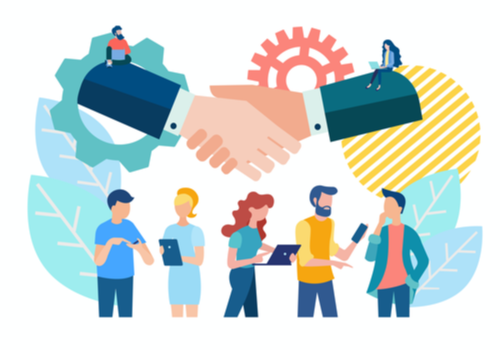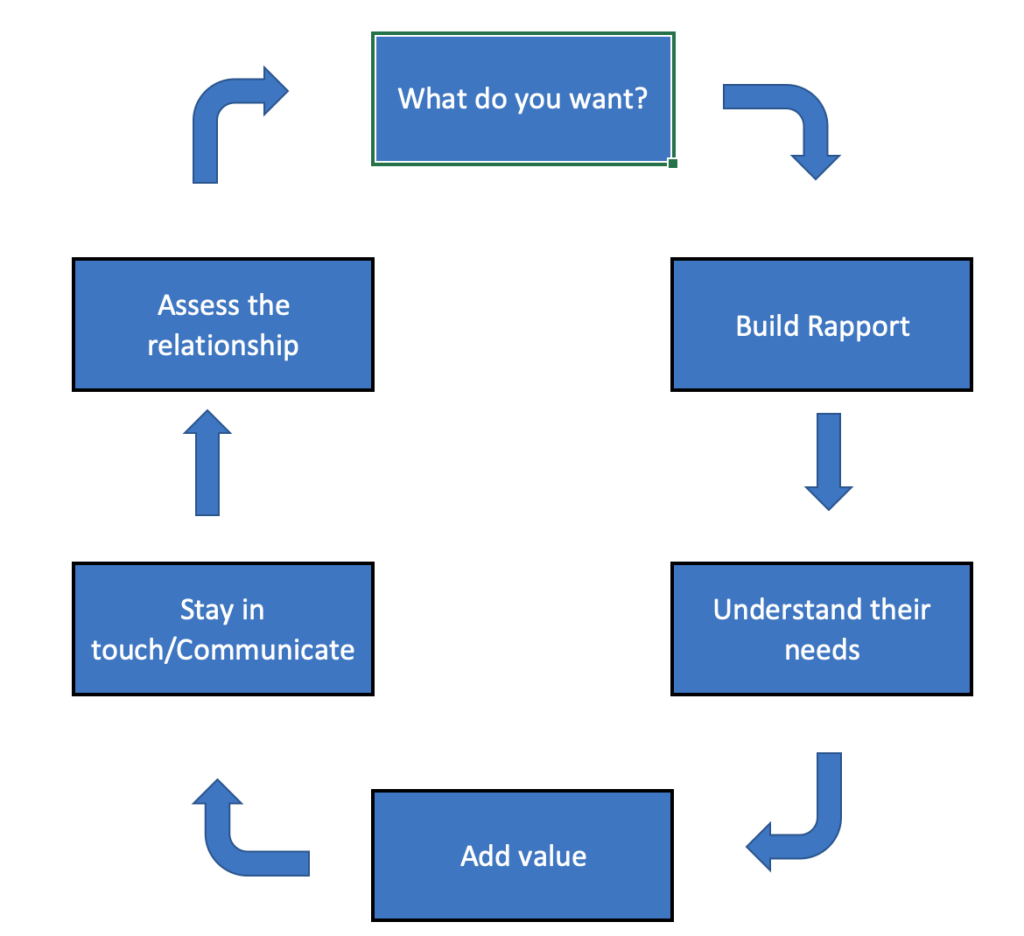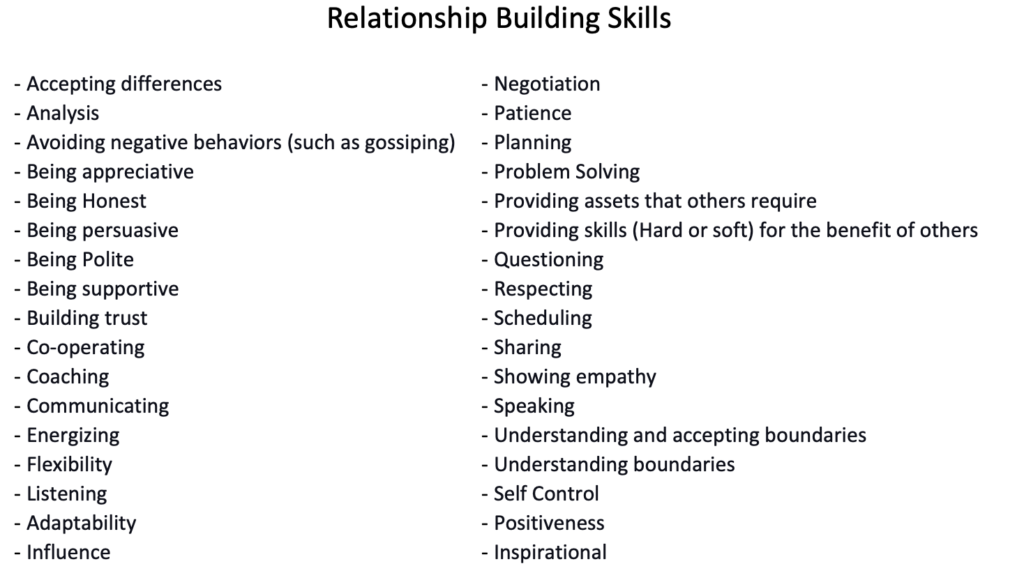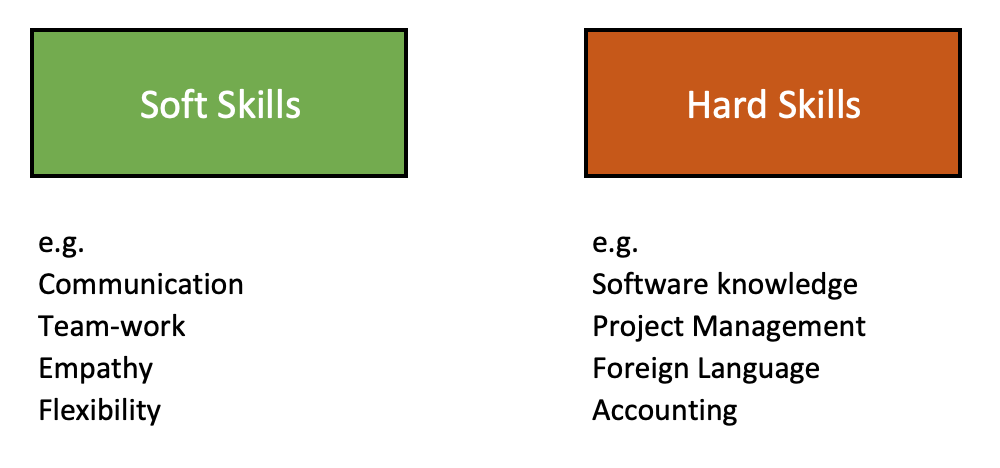
Strong relationships are integral in a successful and effective workplace.
Why?
Good relationships help bring the best out of people; they facilitate teamwork and camaraderie, ultimately contributing to making both people and teams more effective.
An organization that is full of poor relationships is unlikely to be truly successful. Negative relationships not only breed disharmony but also negatively affect performance.
With more motivated and engaged employees, organizational goals are far likely to be met.
In this article, we’ll be looking at the relationship building skills needed to build positive relationships, how you can develop these skills, and how you can utilize them to build those critical relationships with your colleagues in the workplace.
In this post, we’ll be covering:
- Why positive relationships matter
- Relationship building process
- Relationship Building skills
- Emotional Intelligence
- Sustaining relationships
- What makes a good relationship?
- How to handle difficult relationships?
Why positive relationships matter
Workplace relationships directly impact employee engagement within the workplace and the efficiency and effectiveness of the organization.
Relationships directly affect the achievement of goals and performance employee indicators such as well being and staff retention.
Poor relationships drive low morale, facilitate stress, and impact employee commitment. Performance is directly impacted as a result.
Relationship building process
Ahead of looking at the key skills, let’s briefly look at the relationship building process. We’ll do this as it’s useful to consider each skill in context and which skills can be applied to which stage.
The cyclical process typically contains a series of steps.

1/ Determine what you want/ Objective of the relationship
2/ Build rapport
3/ Understanding their needs
4/ Add value
5/ Stay in touch
6/ Assess the effectiveness of the relationship
You can find more on the relationship building process by clicking the link.
Relationship Building Skills
There is a great range of hard and soft skills that you can develop to build lasting work relationships.
The table below shows some of the skills associated with building successful relationships

Relationship building skills typically fall into two categories.
Hard skills – Teachable skills that are easy to quantify
Soft Skills – People skills

Relationship building relies heavily on the effective use of soft skills; you both learn and develop soft skills.
Soft skills generally rely on a level of emotional intelligence.
To become effective at building relationships, both sets of skills will require practice.
Ok, so now let’s look at which skills we’d use in each of the steps in the process of building a relationship.
Below is not an exhaustive list of skills but should demonstrate the types of skills that are important at each stage.
You’ll see that Some of these may repeat throughout the process while some may only be used in specific steps.
| Step | Skills |
| 1/ Ask yourself what you want from the relationship | – Questioning – Being Honest – Understanding value – Planning – Flexibility – Negotiation – Understanding your boundaries |
| 2/ Building rapport | – Being Polite – Listening – Speaking – Questioning – Being Honest – Building trust – Being supportive – Being persuasive – Sharing – Co-operating – Respecting – Accepting differences – Patience – Showing empathy – Flexibility – Being appreciative – Avoiding negative behaviors (such as gossiping) – Understanding boundaries |
| 3/ Understanding their needs | – Being Polite – Listening – Questioning – Respecting – Accepting differences – Showing empathy – Understanding and accepting boundaries |
| 4/ Add value | – Listening – Speaking – Questioning – Being supportive – Coaching – Providing skills (Hard or soft) for the benefit of others – Providing assets that others require – Energizing – Co-operating – Flexibility – Negotiation – Problem Solving |
| 5/ Stay in touch | – Planning – Communicating – Scheduling – Listening – Speaking – Being supportive – Patience – Flexibility |
| 6/ Assess the effectiveness of the relationship | – Listening – Speaking – Questioning – Being Honest – Analysis – Problem Solving |
Emotional Intelligence
We touched on emotional intelligence earlier, and as you can see from the above, there is a significant reliance on it.
Emotional Intelligence can be defined as an ability to understand your emotions and those of those around you, using them in a positive way to engage with others, communicating effectively, empathizing with them, avoiding conflict, and overcoming challenges.
Emotional Intelligence is often the key difficulty in building relationships, with self-awareness, empathy, and social skills becoming the stumbling blocks. It can, at times, seem that some people have it, and some don’t, but it can be learned and developed.
These attributes can take some time to master, and it’s important when building relationships that a specific focus on these skills is given from the outset.
A poor understanding and grasp of emotional intelligence can often lead to poor relationships.
Sustaining Relationships
Remember, when you’ve developed a relationship, it will need to be sustained.
Sustaining a relationship requires regular interaction and commitment.
A failure to sustain a relationship will diminish the value received by both parties and reduce its effectiveness.
What makes a good relationship?
As different relationships deliver different things (and different things to different people), it can be hard to define what makes them good (and whether our use of skills has been effective); let’s look at two examples
- 1 – You have developed the relationship in order for it to be supportive where problems occur; you use the relationship to discuss issues and have a sounding board for solutions
- 2 – You are a mentor where you are helping another develop their skills and experience in a particular field.
Both of these are forms of professional relationships but with different outcomes.
The key here, and what determines whether a relationship is successful, is that all parties are getting some level of benefit from the relationship.
A successful relationship can be characterized by one delivers levels of value to both parties.
Values may be of several types
1/ Physical value – i.e., your colleague helps you to deliver a report.
2/ Emotional Value – i.e., your colleague offers you emotional support (i.e., helps you address conflict, is appreciative for a task done).
How to handle difficult relationships?
Sometimes relationships can be challenging. These may fall into several categories
- Good relationships that have become challenging
- Relationships that have constantly been challenging
What can you do when faced with difficult relationships?
One way is to review the relationship process again and consider which step may have gone awry and which skills you may have underperformed.
You should:
- Look for areas of mutual interest/goals
- Consider previous positive history
- Consider arbitration or support from others outside the conflict
- Listen to the other side
- Analyze your own behavior
Summary
Building and maintaining professional relationships can be hard work, take time, and require the use and development of various skills.
These skills are best divided into Hard and Soft Skills.
Relationship building relies heavily on emotional intelligence, which can be learned and developed over time.
It is more than likely that you come across some relationships that will be challenging. It is important, when these occur, that you take the time and effort to understand what has gone wrong and what can be improved.
Have some tips for developing great professional relationships? We’d love to hear from you; you can tweet us at @sanbustrain or use the comments section below.
This article is part of our Human Resources Guide.